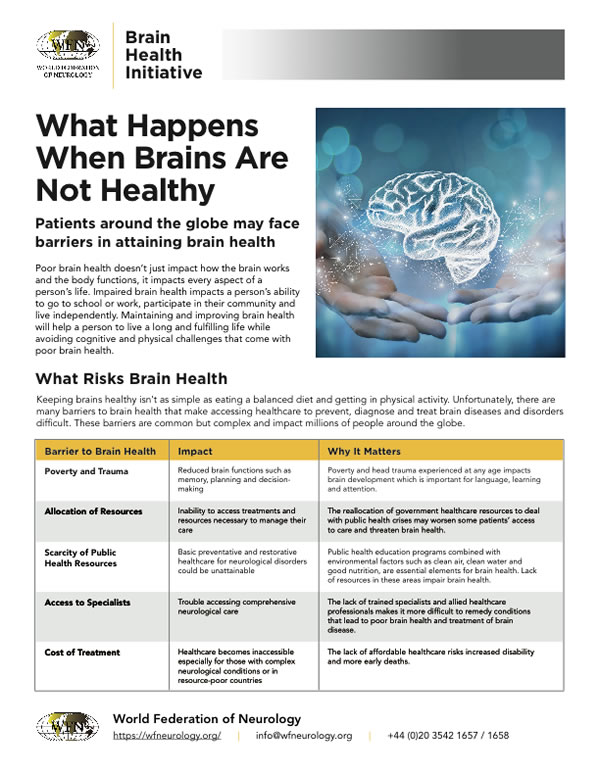What Happens When Brains are Not Healthy
What Makes Your Brain Unhealthy?
People around the world face many barriers to brain health
When our brains aren’t healthy, our bodies and lives are impacted. The brain controls our thoughts, speech, memory and emotions and determines our personality, judgment and sociability. It controls the movement of our bodies, including the complicated systems we rely on to breathe, digest, circulate blood, fight infection and more.
Brain injuries caused by stroke, trauma, inflammation and infections; degenerative diseases; and immune-mediated diseases all impact our health in many ways—both big and small. Poor brain health can alter a person’s life as they know it, causing decreased cognitive and physical function. This reduces our level of independence, prematurely removes us from the community and workforce, and adds to the burden of care—which has a cumulative impact on society.
While early detection and proper treatment can delay the effects of many brain diseases, not every patient around the world has equal access to care. Barriers to healthcare treatment include expensive medical care, limited access to qualified doctors and specialists, and unavailable treatment options. Patients also face poverty and trauma, the scarcity of public health resources and a lack of public health education.
Barriers to Improving Brain Health
Keeping your brain healthy will help you live a long and fulfilling life and avoid cognitive and physical challenges that come with poor brain health. When our brains are not healthy, our bodies and lives are impacted.
There are many common but complex issues patients face that all impact brain health. The following barriers make it more difficult for patients to prevent, receive a diagnosis and treat brain diseases and disorders:
- Poverty and Trauma — Both poverty and trauma experienced at any age impact brain development, reducing important brain functions such as memory, planning, and decision-making, which depend on language, learning, and attention.
- Reallocation of Resources — During the global COVID-19 pandemic, many government systems have had to reallocate healthcare resources to deal with the public health crisis. This has left many neurological patients unable to access treatments and resources necessary to manage their care.
- Scarcity of Public Health Resources — Environmental factors such as clean air, clean water and good nutrition, combined with public health educational programs, are essential elements for brain health. Lack of resources in these areas, resulting perhaps from an insufficient health budget or lack of focus on public health, means that basic preventative, and restorative healthcare for neurological disorders could be unattainable for many who need them.
- Access to Specialists — According to the World Health Organization, only about 25% of the world’s population has access to more than one trained neurologist per 100,000 people. This lack of highly trained specialists and allied healthcare professionals make access to comprehensive neurological care more difficult. Neurologists are essential advocates to remedy conditions that lead to poor brain health and for the diagnosis and treatment of brain disease.
- Cost of Treatment — The high cost of care makes treatment inaccessible for many patients. Those with complex neurological conditions are especially affected. But so too are those in resource-poor countries where even basic healthcare is beyond reach.
But just as great as the challenges faced by people trying to protect and maintain their brain’s health are the benefits of doing so. Brain health impacts everything from quality of life, independence, position in the workforce, and even affects your family, community and society as a whole. So, keeping your brain healthy will help you to live a long and fulfilling life and avoid the cognitive and physical challenges that come with poor brain health.









